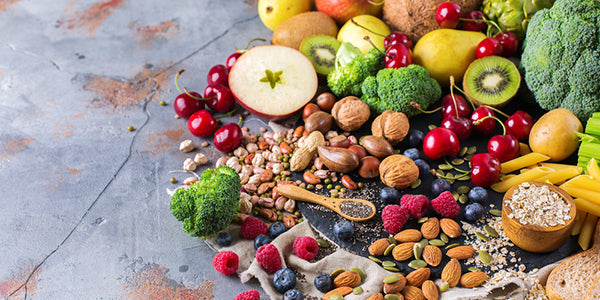
It’s no secret that carbohydrates have a bad rep and a strong tie to weight gain. The diet industry basically portrays carbohydrates as addictive gremlins that immediately get stored as fat upon consumption.
However, by doing so, they fail to recognize that not all carbs are created equally. Just like there are high and low-quality versions of fat and protein, the same is true for carbohydrates.
Allow this to serve as a comprehensive guide about healthy complex carbohydrates!
Carbohydrates 101
Before diving into complex carbs, it’s vital to understand carbohydrates in broad terms.
Carbs are one of the three macronutrients along with protein and fat. Whereas protein helps the body grow and repair and fat helps with cellular communication and supply energy, carbs are considered to be the body’s main fuel source.
Two of the most metabolic tissues, the brain, and muscles readily utilize carbohydrates while the liver stores additional carbohydrates for later use. When carbohydrates are overconsumed, which is all too common in today’s culture of supersized portions, they do indeed get stored as fat. However, as you’ll learn, this doesn’t make them a villain to be feared.
Rather, it’s important to distinguish between the quality of carbs while being mindful of overall portions.
Carb Categorization
Similar to how fats are categorized by their chemical structure – i.e. how many double bonds they have – so too are carbohydrates.
People typically understand carbs as “simple” or “complex.” These categories differentiate between their chemical structure, rate of absorption, and impact on insulin secretion and blood sugar management.
Simple Carbohydrates
Otherwise called sugars, simple carbohydrates contain one or two sugar molecules:
•Monosaccharides refer to a one sugar molecule and include fructose, galactose, and glucose.
•Disaccharides encompass two sugar molecules and include sucrose, maltose, and lactose.
Their shorter structure allows them to be digested and absorbed more rapidly compared to complex carbs. This is beneficial at times when quick fuel is needed, like before a long endurance race. However, this physiologic mechanism can pose problems for long-term blood sugar management and insulin sensitivity, which then has metabolic implications.
Some healthful foods like fruit, vegetables, and dairy contain natural simple sugars. But more often than not, simple sugars tend to come from inflammatory, refined, nutrient-void food sources like:
•Cookies, cakes, and pastries
•Crackers and chips
•Table sugar and corn syrup
•Candy and other processed/packaged snacks
•Soft drinks, juices, and sports drinks
•White bread and pastas
•Breakfast cereals and bars
There is certainly still a way to include some of these carbohydrate rich foods in moderation into an overall healthy diet. However, making them the majority of one’s diet typically doesn’t positively benefit vitality or longevity.
Complex Carbohydrates
Known as starches or polysaccharides, which contain three or more sugar molecules, complex carbs have a longer structure. This causes them to be digested and absorbed slower than simple carbohydrates, providing positive metabolic implications.
In addition, complex carbs are consumed in their whole, unprocessed forms. Thus, in addition to providing energy, they also tend to be a solid source of fiber, essential vitamins and minerals, and other beneficial plant polyphenols.
Complex Carbs List
•Beans and legumes: lentils, peas, peanuts, edamame, chickpeas, beans including kidney, black, pinto, and navy
•Fiber-rich veggies: broccoli, cauliflower, leafy greens, artichokes, carrots, celery, bell peppers and onion
•Fiber-rich fruits: apples, berries, pears, plums, bananas, and avocado
•Starchy vegetables: beets, butternut squash, potatoes, pumpkin, green beans
•Whole grains: whole wheat breads, sourdough, pastas and cereals, oats, rice, quinoa, rye, farro, barley, millet
•Nuts and seeds: chia, flax, pumpkin, sunflower, walnuts, almonds, cashews, brazil
Health Benefits of Complex Carbs
So, how can this “complex” type of carbohydrate benefit health? From sustained energy to controlled blood sugar levels, taking a bite out of the complex carbs list can treat the body well.
1. Sustain Energy
Glucose is indeed the body’s preferred fuel source because it’s reliable and efficient when little to no insulin resistance is present.
Simple carbs supply quick energy that leads to blood sugar spikes and drops. However, complex carbs offer lasting energy thanks to their structure.
The body takes longer to break apart their bonds and structures. This provides a more sustained amount of fuel that does not lead to the wild blood sugar ride, and is especially important for those managing diabetes.
2. Promote a Healthy Weight
Thanks to their fiber content and satiation effect, complex carbs can help promote a healthy weight for folks. The fiber provides antiinflammatory properties like antioxidants and their innate structure along with fiber encourage fullness for a sustained amount of time.
In turn, this may encourage individuals to consume fewer, unnecessary calories. And, overall, will naturally make losing weight and maintaining a healthy weight range easier!
3. Regulate Blood Sugar
As mentioned, complex carbs are digested and absorbed at a healthful rate. This allows the pancreas to steadily secrete insulin as needed and preserves cells’ sensitivity to insulin in the long run.
Complex carbs help prevent the blood sugar roller coaster that can induce symptoms of irritability, headaches, and sudden fatigue. Instead, they provide lasting fuel that decreases cravings and maintains a better hormone balance.
4. Support Digestive Health
The fiber found in complex carbohydrates support bowel health and regularity. This is mostly due to the bulk-forming insoluble fiber sources like fibrous veggies, fruits and nuts that bare a tough skin.
Diets rich in fiber have also been shown to protect from diseases of the colon, hemorrhoids and colorectal cancer.
5. Increase Vitality and Longevity
Finally, complex carbs are consumed by some of the most healthful communities around the world like the popular Mediterranean and within Blue Zones.
The people living in these areas literally boast the highest rates of vitality and longevity. This may be related to their ability to reduce cognitive impairment and mortality risk.
What’s more, eating more wholesome, healthy foods and maintaining a healthy weight lowers the risk of countless chronic health diseases. These include, but are not limited to, type 2 diabetes and heart disease.
The Simple Bottom Line
Carbohydrates are not inherently bad, but they are also not all created equally. Simple carbs have a smaller structure that makes them spike blood sugar and initiate significant insulin secretion. They’re most prevalent in refined and inflammatory foods, deeming them less ideal for good health.
Conversely, complex carbs are unrefined and often contain very healthful fiber, vitamins and minerals, and other beneficial plant compounds. Consuming more of these kinds of carbohydrates is a cornerstone of the evidence-based Mediterranean diet and the dietary patterns of long-living Blue Zones around the world.
Complex carbs have numerous health benefits such as promoting a healthy weight range and regulating blood sugar. They can likewise be enjoyed fairly liberally with no added guilt!
Do not let keto fear mongers take away your precious potatoes!







